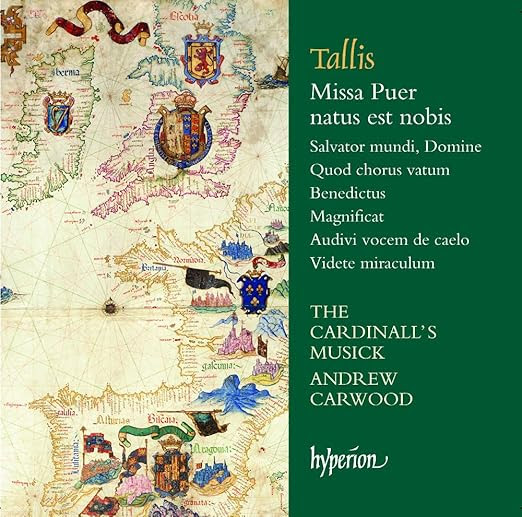Program: #15-49 Air Date: Nov 30, 2015
To listen to this show, you must first LOG IN. If you have already logged in, but you are still seeing this message, please SUBSCRIBE or UPGRADE your subscriber level today.
We are joined once again by Andrew Carwood of the Cardinall’s Musick to share some of the intimate and sensitive seasonal music by the English master.
NOTE: All of the music on this program is from the recording Tallis—Missa Puer natus est nobis featuring The Cardinall’s Musick directed by our guest Andrew Carwood. It is on the Hyperion label and is CD# CDA68026. For more information on this ensemble:

Gramophone Record of the Year-winning group The Cardinall’s Musick continues its exploration of Tallis’s sacred music. These recordings not only showcase the greatest repertoire of the English Renaissance in dazzling performances, but also illustrate the complex historical and political background of the works and their genesis.This volume presents Tallis’s extraordinary seven-voice Mass, Missa Puer natus est nobis, which dates from the Catholic reign of Mary I. In his fascinating booklet notes Andrew Carwood writes that this Mass is ‘something of a marriage between the English and Spanish Chapels, not only in its scoring but also in its sound world … the piece is sonorous and rich, a gorgeous background tapestry for a solemn celebration of the Mass, and has wonderful dramatic effects including the use of antiphony or dialogue between voices. It is a shame that Tallis wrote no more in this vein but, perhaps like Mary’s short-lived Restoration, it was a piece of the moment not to be repeated’. Other works recorded here include what is possibly Tallis’s earliest work, the four-part Latin Magnificat, and the gloriously splendid Videte miraculum, a masterpiece with a ‘rich palette of colours, enhanced by suave melodic writing with a slow-moving harmonic pulse tinged with heart-achingly gorgeous cadences’.
From The Limelight: Thomas Tallis was destined, as the old Chinese curse puts it, to live in interesting times. Luckily, for him and for us, he defied fate and kept his head joined to the rest of his body through many of England’s religious troubles. Andrew Carwood and his expert singers have produced an engaging program of works that reflect both the liturgical and musical diversity of the period. At the centre of this disc is the imposing seven-voice Missa Puer natus est, which seems to have been written in the reign of Mary Tudor. While being based on the cantus firmus of the plainsong introit for Christmas, its lack of a high treble part and solo sections attest to the composer’s ability to adapt his craft to available forces (in this case, Philip II’s Chapel Royal). On the other side of the ecclesiastical ledger, we are given a sonorous setting for lower voices of the Benedictus (Blessed be the Lord God of Israel) to be sung at Mattins according to Cranmer’s Book of Common Prayer. A Latin Magnificat (probably Tallis’s earliest surviving work) makes a fascinating contrast not only with the plainer English setting but with his later Catholic works. On the other side of the ecclesiastical ledger, we are given a sonorous setting for lower voices of the Benedictus (Blessed be the Lord God of Israel) to be sung at Mattins according to Cranmer’s Book of Common Prayer. A Latin Magnificat (probably Tallis’s earliest surviving work) makes a fascinating contrast not only with the plainer English setting but with his later Catholic works. Two well crafted hymn settings (Salvator mundi, Domine and Quod chorus vatum) are overshadowed by two more ornate responsories, Audivi vocem and the magnificent Videte miraculum. Carwood’s lively choral sound (which avoids the bland homogeneity of some English groups) makes for satisfying listening. Two well crafted hymn settings (Salvator mundi, Domine and Quod chorus vatum) are overshadowed by two more ornate responsories, Audivi vocem and the magnificent Videte miraculum. Carwood’s lively choral sound (which avoids the bland homogeneity of some English groups) makes for satisfying listening.
1 Salvator Mundi, Domine 4:16
2 Puer Natus Est Nobis 4:22
Missa Puer Natus Est Nobis (24:57)
3 Gloria 9:18
4 Sanctus And Benedictus 7:51
5 Agnus Dei 7:48
6 Quod Chorus Vatum 4:26
7 Benedictus 6:01
8 Magnificat A 4 10:33
9 Audivi Vocem De Caelo 3:44
10 Videte Miraculum 9:16
- See more at: http://www.limelightmagazine.com.au/content/tallis-missa-puer-natus-est-nobis-cardinalls-musick#sthash.z1BwArmn.dpufAt the centre of this disc is the imposing seven-voice Missa Puer natus est, which seems to have been written in the reign of Mary Tudor. While being based on the cantus firmus of the plainsong introit for Christmas, its lack of a high treble part and solo sections attest to the composer’s ability to adapt his craft to available forces (in this case, Philip II’s Chapel Royal).
On the other side of the ecclesiastical ledger, we are given a sonorous setting for lower voices of the Benedictus (Blessed be the Lord God of Israel) to be sung at Mattins according to Cranmer’s Book of Common Prayer. A Latin Magnificat (probably Tallis’s earliest surviving work) makes a fascinating contrast not only with the plainer English setting but with his later Catholic works.
Two well crafted hymn settings (Salvator mundi, Domine and Quod chorus vatum) are overshadowed by two more ornate responsories, Audivi vocem and the magnificent Videte miraculum. Carwood’s lively choral sound (which avoids the bland homogeneity of some English groups) makes for satisfying listening.
- See more at: http://www.limelightmagazine.com.au/content/tallis-missa-puer-natus-est-nobis-cardinalls-musick#sthash.z1BwArmn.dpuf
Composer Info
Andrew Carwood, Thomas Tallis.
CD Info
CDA68026.